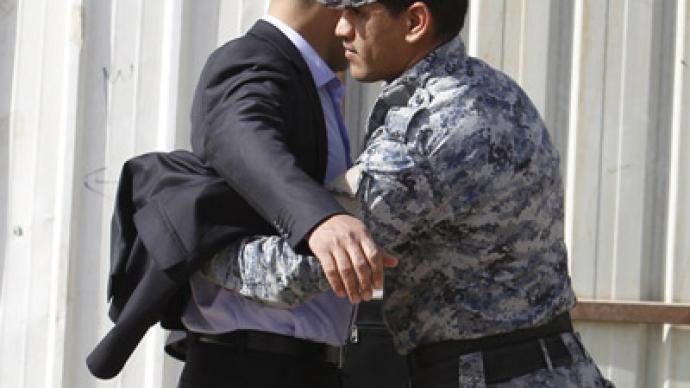Strip searches for everyone, says Supreme Court

Unpaid parking tickets? That’s a strip search. And no leash on your doggie? That’s a strip search too. It might sound weird, and a wee bit terrifying, but that’s the verdict out of the United States Supreme Court this week.
The US Supreme Court decided in a 5-4 vote made Monday that law enforcement officials have the right to conduct invasive strip searches on any arrested persons, no matter how minor the alleged offense might be. The decision comes after the highest court in America examined an earlier case in which a man was wrongly arrested due to a processing error over an unpaid fine and then brought to two separate holding facilities where he was subjected to searches he says were“humiliating."Albert Florence was arrested in New Jersey back in 2005 after his pregnant wife was pulled over for driving their car above the posted speed limit. Responding officers identified Mr. Florence on the scene in the passenger seat and discovered a warrant for his arrest stemming from unpaid fines. An investigation would later reveal that the fines in question had indeed been paid in full, but before law enforcement could come to that conclusion, Mr. Florence spent a week behind bars. While detained, Florence was forced to strip naked, squat and manipulate his genitals twice for inspecting officers examining him for contraband, gang-related markings and communicable diseases.Florence would go on to argue that the way he was handled over a minor (and incorrect) offense violated his rights under both the Fourth and Fourteen Amendments of the US Constitution, an argument a Federal District Court agreed with during an initial hearing. A Third Circuit Court would later rule, however, that strip-searching nonindictable offenders without reasonable suspicion was not a constitutional violation, which in turn brought the case to the Supreme Court. On Monday, five justices sided with the appeal and agreed that any detained alleged criminal, regardless of the crime, could be strip searched if deemed necessary by law enforcement. In explaining the five high judges that concurred with the Supreme Court ruling, Justice Anthony M. Kennedy writes that courts cannot second-guess how correctional officers decide to handle incoming detainees at American institutions. Kennedy acknowledges in the opinion that even with 13 million people being sent to prisons in the US on an annual basis, it is still often in the best interest of law enforcement to subject all suspects, regardless of the severity of their alleged crime, to strip searches."People detained for minor offenses can turn out to be the most devious and dangerous criminals," the five concurring justices agree."Every detainee who will be admitted to the general population may be required to undergo a close visual inspection while undressed,” writes Kennedy. The justice also acknowledged the harsh conditions inside American prisons, supporting any sort of search of an alleged criminal. “It is not surprising that correctional officials have sought to perform thorough searches at intake for disease, gang affiliation and contraband,” Justice Kennedy writes. “Jails are often crowded, unsanitary and dangerous places.”For Florence and the four dissenting justices, however, many are being subjected to a type of search that they shouldn’t have to deal with. Mr. Florence says he was instructed to “squat and cough” by jail officials, who also barked at him, “spread your cheeks.” “It was humiliating. It made me feel less than a man,” Florence says of both strip searches.Justice Stephen G. Breyer was one of the four dissenters and argues that, in cases such as this, strip-searches were “a serious affront to human dignity and to individual privacy.” In voicing her opposition to the court’s opinion, Justice Breyer added that the ruling would mean violating a leash law in some jurisdictions could cause an arrested person to undergo similar searches. Susan Chana Lask, an attorney for Mr. Florence, said the decision should have been expected given the other constitutionally damning legislation added to the books in recent years, including the provisions within the National Defense Authorization Act that allow for the United State to detain any American indefinitely without charge for suspected terrorist ties."The 5-4 decision was as close as we could get … in this political climate with recent law for indefinite detention of citizens without trial that shaves away our constitutional rights every day,” Lask tells the Associated Press.














